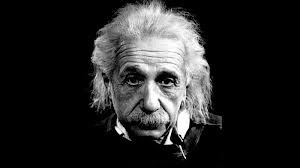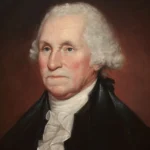
Albert Einstein was born on the 14th of March 1879 and died on the 18th of April 1955.
Born in Germany to a Jewish family, Einstein made many contributions to the field of theoretical physics.
Even when very young, Einstein showed great ability in both math’s and science. He was naturally curious and had a brilliant analytical mind.
Einstein worked in a patent office evaluating patents for electromagnetic devices not long after he graduated.
He produced perhaps one of the most famous equations ever: E = mc² (energy equals mass multiplied by the speed of light squared).
He is also well known for his theory of relativity. Special relativity being introduced in his 1905 paper “On the Electrodynamics of Moving Bodies” before Einstein developed the theory of general relativity between the years of 1907 and 1915.
Einstein won the 1921 Nobel Prize in Physics for his work on theoretical physics.
He worked on many other influential theories and projects including: the deflection of light by gravity, the quantum theory of atomic motion in solids, Brownian motion, an explanation for capillary action and much more.
Famous Albert Einstein quotes include: “Whether you can observe a thing or not depends on the theory which you use. It is the theory which decides what can be observed.”
“If I were not a physicist, I would probably be a musician. I often think in music. I live my daydreams in music. I see my life in terms of music…. I do know that I get most joy in life out of my violin.”
“Physical concepts are free creations of the human mind, and are not, however it may seem, uniquely determined by the external world.”
“I am enough of an artist to draw freely upon my imagination. Imagination is more important than knowledge. Knowledge is limited. Imagination encircles the world.”
Adolf Hitler came to power when Albert Einstein was on way to the United States of America in 1933.
He did not return back to Germany despite working as a professor at the Berlin Academy of Sciences.
During World War II, Einstein alerted President Franklin D. Roosevelt Germany might be developing an atomic weapon.
Einstein published more than 300 scientific papers along with over 150 non-scientific works.
His mass energy equivalence formula E = mc2 is considered the “the world’s most famous equation”.
He won the 1921 Nobel Prize for Physics for his work on solar energy and photovoltaics. He actually received the award in year 1922.
Much of the money earned by Einstein by way of Nobel Prize was lost in the Great Depression.
Einstein visited New York City for the first time on 2 April 1921 upon the invitation of the Mayor.
Einstein visited Palestine for 12 days in what would become his only visit to that region.
Einstein became an American Citizen in 1940.
During the Autopsy, the pathologist of Princeton Hospital, Thomas Stoltz Harvey, removed Einstein’s Brain for preservation, without the permission of his family, in hope that the neuroscience of the future would be able to discover what made Einstein so intelligent.
The chemical element 99, Einsteinium, was named for him in August 1955, four months after Einstein’s death.
An internal bleeding caused by the rupture of an abdominal aortic aneurysm on April 17, 1955 is believed to be the cause of his death. Einstein refused surgery and died the next day having worked till the end.
His remains were cremated and his ashes were scattered at an undisclosed location.
FAQs about Albert Einstein
Here are some frequently asked questions about Albert Einstein, along with detailed answers:
Early Life and Education
- When and where was Albert Einstein born?
Albert Einstein was born on March 14, 1879, in Ulm, Germany.
- Did Einstein struggle in school?
This is a common misconception. While Einstein may not have enjoyed rote learning and clashed with some teachers, he excelled in math and science from a young age. He even taught himself geometry at 12!
- What was Einstein’s educational background?
Einstein attended the Swiss Federal Institute of Technology (ETH) in Zurich, where he obtained a teaching diploma in mathematics and physics in 1900.
Work and Achievements
-
What are Einstein’s most famous theories?
-
Theory of Relativity: This theory revolutionized our understanding of space, time, gravity, and motion. It includes:
- Special Relativity (1905): This theory proposed that the laws of physics are the same for all observers in uniform motion, and introduced the concept of a spacetime continuum.
- General Relativity (1915): This theory explained gravity as a curvature of spacetime caused by mass and energy.
-
Photoelectric Effect: In 1905, Einstein explained the photoelectric effect, which showed that light behaves like a particle (photon) under certain circumstances. This laid the foundation for quantum mechanics.
-
-
Did Einstein win a Nobel Prize?
Yes, although surprisingly not for his theory of relativity. Einstein won the 1921 Nobel Prize in Physics “for his services to theoretical physics, and especially for his discovery of the law of the photoelectric effect.” The Nobel committee at the time reportedly struggled to understand the full significance of relativity.
Personal Life
- Was Einstein bad at math?
Absolutely not! Einstein was a brilliant mathematician whose work was crucial in developing his groundbreaking theories.
- Did Einstein flunk out of school?
No, Einstein graduated from ETH Zurich with a teaching diploma. There may be some confusion because he was rejected from an academic position he applied for after graduation.
- Who was Einstein’s wife?
Einstein was married twice. His first wife was Mileva Marić, a fellow physicist whom he married in 1903. They divorced in 1919. In the same year, he married Elsa Löwenthal.
Legacy
- Is Einstein’s theory of relativity still relevant today?
Absolutely! Einstein’s theory of relativity is a cornerstone of modern physics. It is essential for our understanding of the universe, from the motions of planets to the behavior of light around black holes.
- Why is Einstein considered a genius?
Einstein’s genius lies in his ability to challenge established theories and propose radical new ideas that have been confirmed by experiments. He also had a deep understanding of mathematics and physics, which allowed him to develop these groundbreaking theories.
These are just some of the frequently asked questions about Albert Einstein. If you have any further questions or would like to delve deeper into specific aspects of his life and work, feel free to ask!








